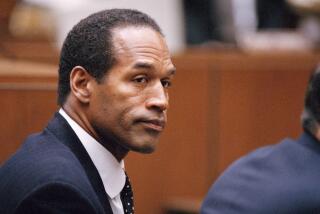For John Grisham, a time to reflect on books and politics

John Grisham is the world’s most successful author of legal thrillers (and one baseball novel, last year’s “Calico Joe”) with sales of more than 275 million copies to his credit. He talked by phone from his office in Charlottesville, Va., about “Sycamore Row.” His latest novel returns to Clanton, Miss., the setting of his most popular book, “A Time to Kill,” later made into a film and a play that recently closed after a brief run on Broadway.
What made you decide to return to small-town lawyer Jake Brigance and Clanton almost 30 years after “A Time to Kill”?
Over the years, if people get close enough to offer an opinion about the books, they’re probably going to say, “The first one is my favorite. When are you going to get back to Ford County?” So I’ve often thought about another story with Jake and the cast of characters. I did not want another big racially charged murder trial, because most small Southern towns don’t have those on a weekly basis. It took a while to piece together the plot.
Was it inspired by any real events?
No. I’m fascinated by will contests. Almost every large family fortune in this country has been fought over at some level after the death of the person who made the money. And they’re really juicy fights because it’s family against family. I’ve always enjoyed those stories, sad as they are, but there isn’t one case that inspired this book.
Both “Sycamore Row” and “A Time to Kill” deal with racial politics in Mississippi. In light of the state’s new voter I.D. law, how much progress had there been under the recently overturned Voting Rights Act?
There’s been a lot of progress. Mississippi has more black officeholders than any other state. It also has a much higher black population. That’s huge progress. I was elected to the Mississippi Legislature 30 years ago, and at the time, there were 122 members, and I think we had 19 black members out of a state that’s 35% black. So the math doesn’t work there. Nowadays there are close to 40 members of the black caucus, double the numbers, which is huge progress. So the Voting Rights Act was crucial down there because for decades a lot of white people had enacted all these various schemes to suppress black voter registration and black voting. And that was the purpose of the law, and the law worked for 50 years. And now the law is gone, and what you’re seeing in states like North Carolina, Texas and Mississippi — states that were under the law — they’re now going back to their old ways and cooking up schemes to make it more difficult for black folks to register to vote.
Speaking of your time as a state rep in the ‘80s, why did you get out of politics?
Well, it really wasn’t any fun. I did not enjoy having to answer to the voters. I didn’t like the idea that someone could stop you on the street and fill your ear full for 30 minutes just because they voted for you. I got to where I couldn’t stand the voters. And when you’re a politician, that’s a bad place to be.
You always hear about voters hating politicians but not the reverse.
If you’re a politician, you get hammered all the time. The phone rings off the wall and constituents come to your office and camp out and everybody wants something. They want their son out of jail, they want a DUI fixed, a long list of things, but primarily they want jobs and the jobs aren’t there. And they get mad at you because you can’t deliver. So I did not enjoy it.
How do you think the recent stage version of “A Time to Kill” compares to the film?
No comparison. The core story is the same, but you just can’t compare the two because with a film you can go anywhere and have any scene you can imagine, whereas with stage you’re really confined to a small space. You lose a lot of characters onstage, you lose a lot of characters when you go from book to film. It’s the natural process.
You must be incredibly disciplined to write at least one and often two books a year, every year since ’91. Do you have a writing schedule?
Very much so. It’s a lot of discipline. My goal each year is to start writing on Jan. 1 and finish on July 1. I have three or four ideas for my next book and now I’m thinking, let’s flesh these out and see what story’s going to work. Jan. 1 is the kickoff date and I write five days a week for three or four hours every morning, rarely missing. But I’ve got my outline, so I know what the final scene is going to be before I start. When you know that much about your story it’s really hard to get lost. I know we’ll publish the book late in October of next year.
I read your recent newspaper piece about how some of your books have been banned at Guantanamo Bay. Do you know why that is?
I don’t know why. A reporter with the Wall Street Journal found the story and started digging, and the more he dug the crazier it got. When it was all said and done, the authorities said there’s been some mistake. Grisham’s books are not banned. They tried to act like it was a clerical error. So the books are now available. In fact I got an email this morning from a young Algerian guy who served 12 years there and read all the books, and he got out a month or so ago and he’s back in Algeria. He enjoyed the books until they were banned.
Why did you get into young adult fiction with your “Theodore Boone: Kid Lawyer” series?
My daughter is a schoolteacher and about three years ago was her first year of teaching and she had fifth-graders and she was emphasizing reading. She made a casual comment over dinner one night about the fact that she could not find good suspense for her students. She said, “Dad, can you write suspense for kids?” So it became a family project.
More to Read
Sign up for our Book Club newsletter
Get the latest news, events and more from the Los Angeles Times Book Club, and help us get L.A. reading and talking.
You may occasionally receive promotional content from the Los Angeles Times.






